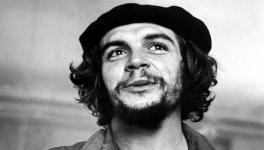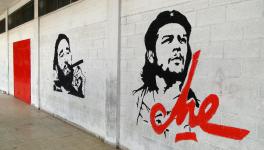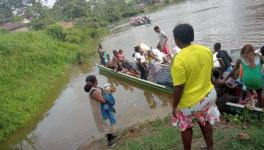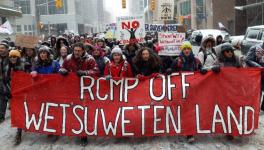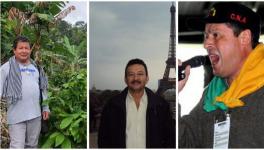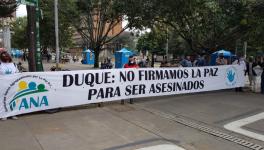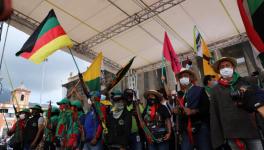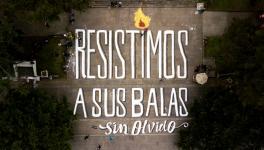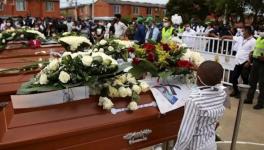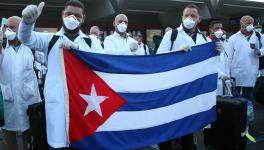Humanitarian Caravan Denounces Humanitarian Crisis, Shines Light on Alternatives in Colombia
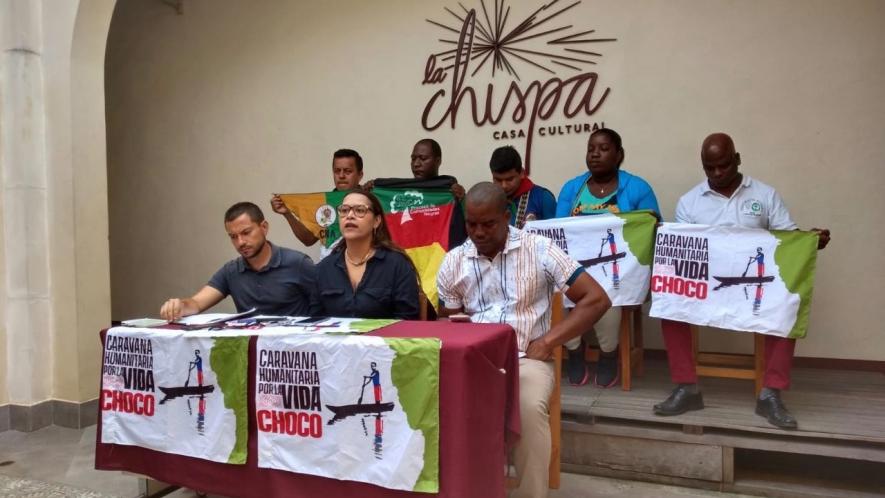
Spokespersons of the regional, national and international organizations participating in the caravan spoke in a press conference on Monday August 5.
On August 5, representatives of over 70 Colombian organizations and as many as 38 internationalist brigadiers began the ‘Humanitarian Caravan for Life’ which will travel across the Bajo Atrato region of Chocó for nine days. The central objectives of the caravan are to condemn the humanitarian crisis, state abandonment, and persecution and assassination of social leaders and human rights defenders.
The Humanitarian Caravan is being conducted by regional organizations like the Black Communities Process (Proceso de Comunidades Negras- PCN), the National Agrarian Coordinator (Coordinador Nacional Agrario– CNA) and the international solidarity network La Red de Hermandad y Solidaridad con Colombia (REDHER).
Chocó is one of the most biodiverse regions in Colombia and has one of the highest concentrations of natural resources. However, it is also one of the regions worst affected by climate change-related natural disasters. The region has also seen the displacement of people and threats by armed groups and heavy militarization. The impact of all these, as well as that of extreme poverty is reflected in the precarious conditions in the health, housing, education and food sectors.
The National Department of Statistics in Colombia estimates that 79.19% of the population in the Chocó department lives without their minimum basic needs being met. 58% of the population lives on less than USD 2.5 per day and 33% of the population lives in extreme poverty on less than USD 1.23 per day. 75.68% of Chocó’s population comprises Afro-descendants, 11.9% are Indigenous people, 7.42% are Mestizo people and 5.01% of the population is white.
Chocó’s strategic location as a corridor connecting the Pacific and the Caribbean has made it a disputed territory between the drug trafficking mafia and the Gaitanista Self-Defense Forces of Colombia. These territorial disputes have devastating effects on the local population. Many communities have been forcibly displaced dozens of times and the population lives in fear. The escalation of the attacks on the National Liberation Army by the Colombian government has also meant an increased military presence in the zone.
Chocó’s immense biodiversity and natural resource wealth has also meant that national and international extractive companies have entered into the territorial dispute.
The organizing committee of the Caravan pointed out that all of these elements are linked: “The sources of poverty are multiple. The armed conflict has displaced the inhabitants dozens of times and in many cases, as part of a plan of territorial reorganization in favor of the exploitation of resources of the territory, with the illegal plantations of palm oil, the exploitation of wood or gold, or the multinational [extractive companies].”
Proposals for alternatives
Despite all odds, the people of Chocó continue to resist. They continue to generate proposals and organize to defend water, life and their territories. The other key objective of the caravan is to support and shine light on these alternative proposals from the communities to fight for a dignified life. The caravan will also facilitate coordination and network building between the local, national and international organizations that are participating.
The internationalist brigadiers hail from Brazil, Guatemala, Ecuador, the Spanish state, Germany, Belgium, the UK, France, Switzerland, and the US and are organized through the Network of Brotherhood and Solidarity with Colombia (REDHER).
The participants of the caravan will split up into three groups to visit different areas of Bajo Atrato. In each route, members of the caravan will participate in dialogue with the communities and collect testimonies about the situation. Cultural and artistic activities will also be held. A medical mission will be carried out, given that one of the biggest challenges in the region is the complete lack of access to medicine and medical care. The medical mission will attend to the most urgent health necessities and distribute basic medical supplies.
The three groups will converge on August 12 at the center of the Riosucio municipality where the conclusions and final statements will be presented at a public event.
Follow Colombia Informa, REDHER, Coordinador Nacional Agrario, Procesos de Comunidades Negras, Congreso de los Pueblos for updates on the caravan.
Get the latest reports & analysis with people's perspective on Protests, movements & deep analytical videos, discussions of the current affairs in your Telegram app. Subscribe to NewsClick's Telegram channel & get Real-Time updates on stories, as they get published on our website.









